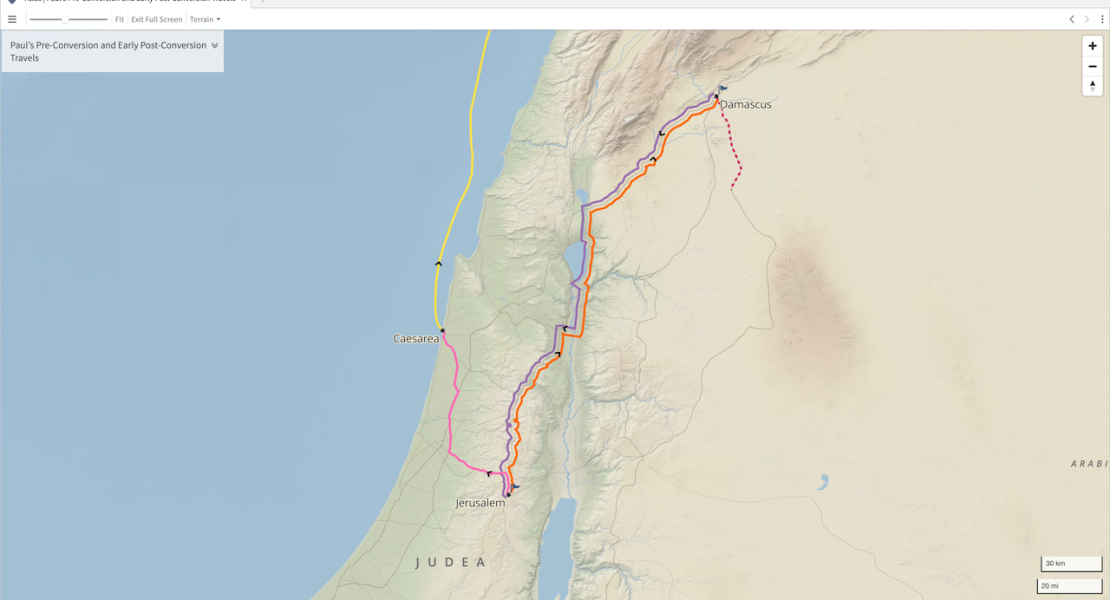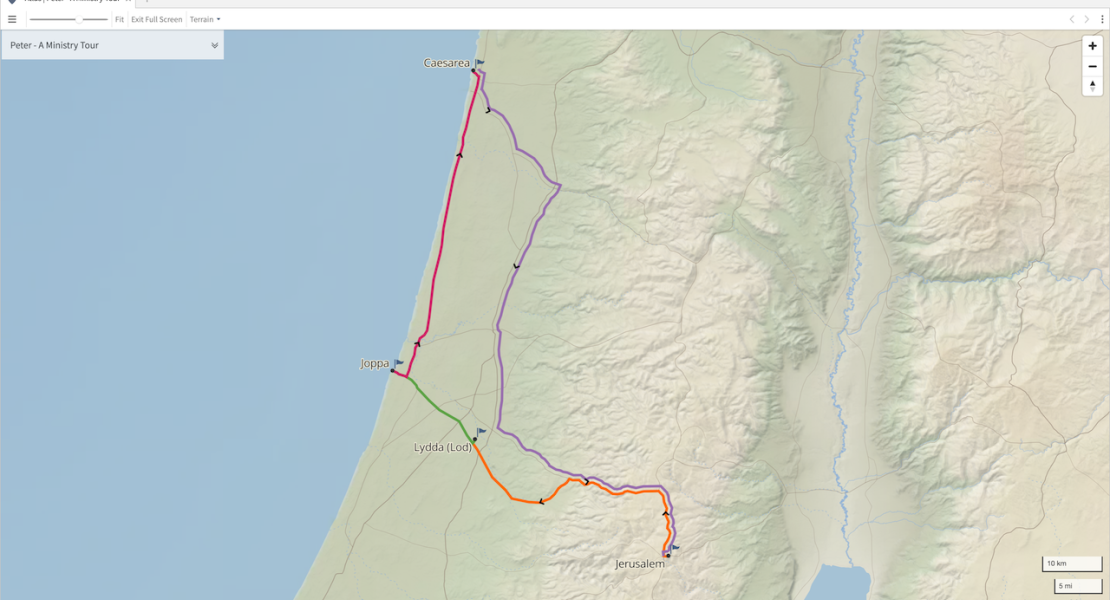Other than chapter 2, Acts 9 is maybe the most well-known of the chapters in Acts because of the dramatic conversion story of Saul/Paul. There are many things to note in this chapter that are easily overlooked by a simplistic reading of “Saul was a bad guy then Jesus appeared and transformed his life”. Most of the chapter is devoted to Saul’s conversion but it’s not exclusively focused on that.
9:1-31
In describing the conversion of Saul, many well-meaning Christians have made it primarily about a moral transformation; the overly simplistic understanding is that Saul was a bad person and then after being converted he was a good person. Though there is a moral dimension to it, the primary transformation is spiritual and theological, when then bears moral fruit. Jesus saves the whole person: body, soul, and spirit! But the resulting works are the fruit of that salvation, not the cause or even the primary reason for salvation. And a close reading of 9:1-31 makes that clear.
9:1-2 One way to better understand that moral behaviour is a fruit of theology is to realize that Saul was “breathing threats and murder” against Jesus’ disciples but the reason for that was actually theological; he was a Pharisee, zealous for Torah and following the commandments. He viewed Jesus not as Lord and Saviour but as a blasphemous traitor to Israel, and so in his mind Jesus’ disciples deserved to be rounded up and persecuted. Notice he’s not doing all this on his own authority but following the “proper channels” by going to the high priest and leaning on his authority to arrest Christians.
Notice also that at this time, Jesus’ disciples aren’t described as “Christians”. They are people “belonging to the Way” (remember that the original Greek didn’t use uppercase and lowercase as we do, so if “Way” is capitalized in your English Bible—as it is in the ESV—that’s a decision made by translators to emphasize the point). We often think about “way” as a way of life, a set of actions for living. But remember that Jesus said, “I AM the Way, the Truth, and the Life” (John 14:6). So, again, following Jesus isn’t primarily about a way of life. It’s belonging to Christ, which then produces fruit that is a way of living. That’s one reason why it might be better to describe Christians as “members” of Christ than “follower” (which focuses on the way of living) or even “disciple” (which focuses on learning and doing). We are followers, we are disciples, but more than both of those things, we are members of Christ’s body. We belong to Him, and that means we follow and learn from Him.
9:2-3 Damascus is “way up north” from Jerusalem, northeast from Galilee (see map below). Saul was nearing there when Jesus appeared to him, and he’s taken into Damascus after Jesus’ appearance to him (9:8).

9:3 Luke gives a clever contrast between “the Way” in 9:2 and “his way” in 9:3. Saul does not at this point belong to THE Way so he’s going his own way.
9:4 This is such an important sentence that’s easy to overlook. Jesus doesn’t ask, “why are you persecuting my disciples?”. He asks, “why are you persecuting me?” The Church is Jesus’ body! This calls to mind other passages such as Matthew 25:31-46 where good or ill done to people belonging to Christ is counted as being done to Him Himself, or John 17:18-25 where Jesus tells the Apostles that they will be hated on account of His name, not theirs.
9:5-7 Despite the visual elements, it is the word of Jesus that Saul hears (along the others with him). It does seem, from verse 7, that Saul saw something that the others didn’t, but we’re not told exactly what that was. We can take from the text that it was the glory of Jesus (a “light from heaven shone around him”, similar to in the Christmas story and other appearances of YHWH to people in the Bible). Still now today, we are brought to conviction over sin—and released from it—by the voice of Jesus.
9:5 Notice the beginning of some kind of confession and acknowledgment by Saul: “who are you, Lord”? And once again the original Greek gives us an easier look at Jesus assuming the Divine name: “egō eimi Iēsous” I AM Jesus. Jesus is not just identifying Himself for Saul, He’s telling the Pharisee Saul who He actually is: YHWH.
9:8 An encounter with the glory of the living God has a profound physical effect. Consider YHWH’s words to Moses in Exodus 33: “no one can see my face and live”, and yet God, in His mercy, hides His full glory from Moses and Saul so that they may still “see” Him and live. (Even in the person of Jesus, where people did indeed see the face of God, His full glory is still somewhat “hidden” for the sake of their good.)
9:10-16 Ananias becomes an instrument of God’s grace for Saul, bringing restoration and forgiveness. Though, as has happened before (think of people like Moses, Gideon, and Peter), there is initial resistance to God’s Word and call. Notice, though, that this isn’t simple unwillingness to listen; it’s based on what Ananias has heard about Saul and his persecution of the Church.
9:15-16 We often think of Saul/Paul as the primary missionary to the Gentiles (i.e. non-Jews). He certainly was that, but not only that; God’s explicit call to him is to both Jews and Gentiles. This becomes evident both later in Acts (even later here in chapter 9) and in Paul’s Epistles.
9:17-18 We’re not told who baptized Saul (though presumably it was Ananias) which is a sign that the focus is not on the baptizer but on the act itself. In addition, the use of the passive voice that doesn’t specify the one doing the action (“was baptized”) is a common way in the Bible to refer to a focus on God’s work (the so-called “divine passive”).
9:20-22 The primary way of doing Christian proclamation among Jewish people was to go to the synagogues and start with the expectation of a Messiah, then show that Jesus of Nazareth is that Messiah. This is a way of starting “where people are at” and then leading the proclamation to Jesus. Saul starts doing this immediately as he stayed with the disciples in Damascus.
9:23-25 Saul now becomes numbered with Peter and John (recall Acts 4 and 5) as someone who is persecuted. The Greek word simply translated as “Jews” in the ESV has the connotation of the Jewish leaders and those who were following them. In connection with the following verses, we surmise that Saul left Damascus here for Jerusalem.
9:26-31 Saul then travels to the centre of both the Jewish and Christian worlds at the time, and then the ministry of the Word “widens” out again. We’re re-introduced to Barnabas (4:36-37), who becomes an important partner in ministry with Saul/Paul later on but who here is instrumental in convincing the Apostles that Saul is legitimate. His name (“son of encouragement”; 4:36) is perhaps no more fitting anywhere than here!
9:29 Saul speaks God’s Word of Law not just to the Jews but to the Hellenists (Greeks) as well, and instead of repenting they too seek to do away with him.
9:31 Luke summarizes this section by saying that the Church (we use a capital-C here to emphasize the one Christian Church) was being strengthened! Despite (and even through!) all these struggles, God does His work.
9:32-43
The focus now leaves Saul and moves back to the ministry of the Apostles and specifically Peter, describing more about how 9:31 was being lived out.
The two examples in this passage are examples of the “signs and wonders” (2:43, 5:12) done by the Apostles as confirmation of their Gospel proclamation, and in both cases the result is that people believed in the Lord.: a healing of a long-sick man named Aeneas and a resurrection to life of a woman who had died named Tabitha/Dorcas. Notice in both that Peter is the agent but it once again is clear that it’s Jesus at work; he says it explicitly to Aeneas: “Jesus Christ heals you”.
9:32 and 9:36 “Here and there” is made more concrete by two examples in towns in southwestern Judea: Lydda and Joppa (see map below).

9:42-43 Peter’s stay at Joppa becomes central to chapter 10, as God will reveal more about His plan to have His Word go beyond the Jewish people.
But what a place to end a chapter on! Simon Peter, "son of Jonah" (Matthew 16:17), is in the place where the Jonah of the Old Testament seeks to run away from the presence of the Lord (Jonah 1:3)! In another great reversal, God will send Simon son of Jonah to Gentiles to preach, and they too will receive it, but Peter will rejoice whereas Jonah became bitter about the fact that God had mercy on the Ninevites.
